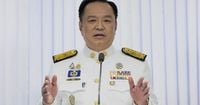In a dramatic turn for Thai politics, Anutin Charnvirakul, a veteran politician with a reputation for shaking things up, officially became Thailand’s new prime minister on September 7, 2025, after receiving a royal endorsement from King Maha Vajiralongkorn. The 58-year-old conservative, best known internationally for championing the decriminalization of cannabis in 2022, now finds himself at the helm of a country facing acute political, economic, and diplomatic challenges.
The road to Anutin’s appointment was anything but smooth. According to Tempo.co, his rise came after the sacking of Paetongtarn Shinawatra, the latest member of Thailand’s once-dominant political dynasty. Paetongtarn, daughter of former prime minister Thaksin Shinawatra, was dismissed by the Constitutional Court on August 29, 2025, for breaching ministerial ethics. The scandal stemmed from a leaked phone call with Cambodia’s Senate President Hun Sen, in which she referred to him as “uncle” and disparaged a Thai military commander. This call, taking place in the tense days before a deadly five-day border conflict between Thailand and Cambodia in July, triggered public uproar and ultimately cost her the premiership.
Anutin, who had served as both deputy prime minister and interior minister in Paetongtarn’s cabinet, wasted little time distancing himself from the embattled leader. As Associated Press reports, he resigned from his cabinet positions and withdrew his Bhumjaithai Party from the governing coalition following the phone call scandal. This move not only weakened Paetongtarn’s government but set the stage for Anutin’s own bid for the top job.
When the time came for Parliament to choose a new leader, Anutin secured the prime ministerial vote on September 5, 2025, with the backing of the main opposition People’s Party—the largest bloc in Parliament. But there was a catch: the People’s Party’s support was conditional. In exchange, Anutin pledged to dissolve Parliament within four months and organize a referendum to draft a new, more democratic constitution. As Los Angeles Times notes, the People’s Party, which runs on a progressive platform, has long sought changes to the constitution imposed during a previous military government. Despite their support, the party announced it would remain in opposition, potentially leaving Anutin’s government as a minority one.
In a formal ceremony at Bhumjaithai Party headquarters in Bangkok, Anutin received his letter of appointment, flanked by senior party members in the crisp white uniforms reserved for royal and state occasions. Reading from a prepared statement, he declared, “I’d like to take an oath that I determine to perform my duties to my fullest capabilities, with honesty and virtue.” Echoing those sentiments, he told reporters, “I will work at my full capacity with honesty and morality worthy of His Majesty’s trust, for the benefit of the people and for the country.”
But what kind of leader is Anutin, and what challenges does he inherit? To many Thais, he is a familiar figure. As health minister during the COVID-19 pandemic, he oversaw Thailand’s response but weathered criticism for delays in vaccine procurement. His most headline-grabbing policy, however, was the successful push to decriminalize cannabis in 2022. While the move was initially hailed as groundbreaking, it soon sparked a backlash, prompting tighter regulations as concerns grew over public health and social order.
Anutin’s political journey has not been without controversy. Associated Press and Los Angeles Times both point to his involvement in scandals, including suspected collusion in the 2024 Senate election—allegedly to benefit certain candidates—and a land dispute involving property linked to his party mentor, Newin Chidchob. Despite these clouds, Anutin has demonstrated remarkable political resilience, outlasting rivals and, as Tempo.co notes, even abandoning former allies when expedient. He was once a staunch supporter of the Shinawatra dynasty, but following Paetongtarn’s ethical breach and the coalition’s collapse, he charted his own course.
The broader context of Anutin’s rise is one of political instability. Thailand has now had three prime ministers in just two years. After the 2023 general elections, the Move Forward Party (now the People’s Party) won the most seats but was blocked from power by military-appointed senators opposed to its reformist agenda. The Senate’s role in selecting the prime minister has since been eliminated, but the aftershocks of that battle linger. Pheu Thai, which came second in the 2023 elections, saw its own candidate, real estate executive Srettha Thavisin, serve as prime minister for only a year before being dismissed for ethical violations. Srettha’s replacement, Paetongtarn, also lasted just a year before her own ouster.
With the Shinawatra dynasty’s grip on power now broken, Anutin faces a daunting to-do list. In his first statements as prime minister, he promised to tackle the country’s urgent problems: the faltering economy, the unresolved border conflict with Cambodia, natural disasters, and rising crime. Perhaps most importantly, he reiterated his commitment to constitutional reform and an early election, vowing to “return power to the people to decide on the future of the country.”
Yet, the path ahead is fraught with uncertainty. The People’s Party, whose support was vital to Anutin’s victory, remains in opposition and continues to push for a more democratic constitution. Pheu Thai, now also in opposition, will watch closely for missteps. The coalition Anutin is trying to build may prove fragile, especially if he cannot deliver on his promises within the four-month timeline. As Tempo.co notes, Anutin’s government may well be a minority one, with little room for error.
Thailand’s recent history offers a cautionary tale for its new leader. The rapid turnover of prime ministers, public frustration over corruption and ethical breaches, and the ever-present tension between populist and establishment forces have left the nation politically weary. Anutin’s own record—marked by policy innovation, controversy, and shifting alliances—means he will face skepticism from many corners. His promise to rewrite the constitution and call an early election may buy him time, but it also sets a high bar for success.
As the new prime minister settles into office, all eyes will be on whether he can navigate the treacherous waters of Thai politics, heal divisions, and deliver meaningful change. The next four months could determine not only Anutin’s legacy but the future course of democracy in Thailand.


